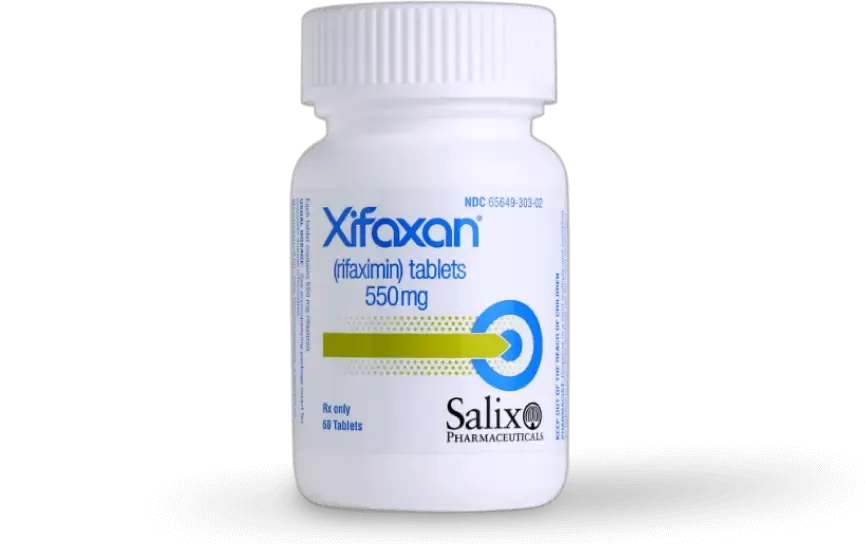Comprehensive Guide to Rifaximin: Uses, Dosage, Side Effects, and More
1. What is Rifaximin?
2. Overview of Rifaximin
Generic Name
Rifaximin
Brand Name
Xifaxan, generics
Drug Group
Rifamycin antibiotic
Commonly Used For
This medication is used to:
- Treat traveler’s diarrhea.
- Manage hepatic encephalopathy.
- Reduce recurrence of irritable bowel syndrome with diarrhea (IBS-D).
Key Characteristics
- Form: Oral tablets (200 mg, 550 mg) (detailed in Dosage section).
- Mechanism: Inhibits bacterial RNA synthesis, targeting gram-positive and gram-negative bacteria.
- Approval: FDA-approved (2004 for traveler’s diarrhea, 2010 for hepatic encephalopathy) and EMA-approved for gastrointestinal conditions.

3. Indications and Uses of Rifaximin
Rifaximin is indicated for various gastrointestinal and hepatic conditions, leveraging its localized antimicrobial action:
- Traveler’s Diarrhea: Treats diarrhea caused by noninvasive strains of Escherichia coli in adults and children (12+ years), reducing symptom duration, per infectious disease guidelines.
- Hepatic Encephalopathy: Manages overt hepatic encephalopathy in adults, reducing ammonia-producing bacteria and preventing recurrence, supported by hepatology trials.
- Irritable Bowel Syndrome with Diarrhea (IBS-D): Reduces frequency of IBS-D symptoms (e.g., abdominal pain, bloating) in adults, improving quality of life, per gastroenterology research.
- Small Intestinal Bacterial Overgrowth (SIBO): Used off-label to treat SIBO, alleviating bloating and malabsorption, with evidence from digestive health studies.
- Clostridium difficile Infection (CDI): Investigated off-label as an adjunct therapy for recurrent CDI, reducing relapse rates, supported by infectious disease cohorts.
- Diverticulitis: Explored off-label to manage acute uncomplicated diverticulitis, reducing inflammation, with preliminary data from surgical gastroenterology.
- Chronic Liver Disease: Employed off-label to prevent hepatic encephalopathy in cirrhosis patients, improving cognitive function, noted in hepatology research.
- Inflammatory Bowel Disease (IBD): Investigated off-label for Crohn’s disease and ulcerative colitis flares, modulating gut microbiota, with emerging gastroenterology evidence.
- Non-Alcoholic Steatohepatitis (NASH): Studied off-label to reduce bacterial translocation in NASH, improving liver histology, supported by metabolic disease trials.
- Post-Antibiotic Diarrhea: Used off-label to prevent diarrhea following broad-spectrum antibiotic use, restoring gut flora balance, with data from infectious disease studies.
Note: This drug is not effective against systemic infections; consult a healthcare provider for persistent or severe symptoms.
4. Dosage of Rifaximin
Important Note: The dosage of this antibiotic must be prescribed by a healthcare provider. Dosing varies by indication and patient response, with adjustments based on clinical evaluation.
Dosage for Adults
- Traveler’s Diarrhea:
- 200 mg three times daily for 3 days, with or without food.
- Hepatic Encephalopathy:
- 550 mg twice daily, taken with or without food, for long-term management.
- Irritable Bowel Syndrome with Diarrhea (IBS-D):
- 550 mg three times daily for 14 days, repeatable for recurrence.
Dosage for Children
- Traveler’s Diarrhea (12+ years):
- 200 mg three times daily for 3 days, under pediatrician supervision.
- Not recommended under 12 years.
Dosage for Pregnant Women
- Pregnancy Category C: Limited data; use only if benefits outweigh risks (e.g., severe traveler’s diarrhea). Consult an obstetrician, with fetal monitoring.
Dosage Adjustments
- Renal Impairment: No adjustment needed; monitor in severe cases (CrCl <30 mL/min).
- Hepatic Impairment:
- Mild (Child-Pugh A): No adjustment; moderate (Child-Pugh B): Use caution; severe (Child-Pugh C): Increase to 550 mg three times daily if tolerated.
- Elderly: Start with 200 mg three times daily; increase cautiously based on response.
- Concomitant Medications: No significant interactions; monitor if combined with P-glycoprotein inhibitors.
Additional Considerations
- Take this active ingredient with or without food, using a glass of water.
- Complete the full course to prevent resistance, even if symptoms improve early.
5. How to Use Rifaximin
- Administration:
- Swallow tablets whole with water, with or without food; avoid crushing or chewing.
- Take at evenly spaced intervals (e.g., every 8 hours for traveler’s diarrhea) for consistency.
- Timing: Use as directed (e.g., twice or three times daily), maintaining the schedule.
- Monitoring: Watch for worsening diarrhea, fever, or signs of allergic reaction (e.g., rash).
- Additional Tips:
- Store at 20–25°C (68–77°F), protecting from moisture and heat.
- Keep out of reach of children due to overdose risk.
- Report severe abdominal pain, persistent vomiting, or signs of dehydration immediately.
6. Contraindications for Rifaximin
This drug is contraindicated in:
- Hypersensitivity: Patients with a known allergy to Rifaximin or rifamycin derivatives.
- Severe Hepatic Encephalopathy with Coma: Contraindicated due to unpredictable response.
- Intestinal Obstruction: Avoid due to risk of worsening.
7. Warnings & Precautions for Rifaximin
General Warnings
- Clostridium difficile-Associated Diarrhea: Risk of C. difficile overgrowth; monitor for persistent diarrhea.
- Hepatic Encephalopathy Worsening: Risk in severe liver disease; assess regularly.
- Antibiotic Resistance: Potential for resistant bacteria; use judiciously.
- Dehydration: Risk with severe diarrhea; ensure hydration.
- Allergic Reactions: Rare hypersensitivity; discontinue if rash develops.
Additional Warnings
- Renal Impairment: Monitor in severe cases; adjust if necessary.
- Neurological Effects: Rare confusion in hepatic encephalopathy; assess mental status.
- Blood Disorders: Rare thrombocytopenia or anemia; check blood counts.
- Photosensitivity: Mild risk with prolonged use; use sun protection.
- Hypersensitivity Reactions: Rare anaphylaxis; discontinue if swelling occurs.
Use in Specific Populations
- Pregnancy: Category C; use only if essential with fetal monitoring.
- Breastfeeding: Excreted in breast milk; monitor infant for effects.
- Elderly: Higher risk of dehydration; start with lower doses.
- Children: Limited to 12+ years; supervise closely.
- Renal/Hepatic Impairment: Adjust dose; avoid in severe cases.
Additional Precautions
- Inform your doctor about liver disease, kidney issues, or recent antibiotic use before starting this medication.
- Avoid abrupt cessation; complete the prescribed course.
8. Overdose and Management of Rifaximin
Overdose Symptoms
Overdose may cause:
- Nausea, vomiting, or abdominal pain.
- Severe cases: Liver dysfunction, dehydration, or allergic reactions.
- Dizziness, headache, or fatigue as early signs.
- Seizures with extremely high doses.
Immediate Actions
- Contact the Medical Team: Seek immediate medical help.
- Supportive Care: Administer IV fluids, monitor vital signs, and correct electrolytes.
- Specific Treatment: No specific antidote; manage symptoms and monitor liver function.
- Monitor: Check kidney and liver function, hydration status for 24–48 hours.
Additional Notes
- Overdose risk is low; store securely.
- Report persistent symptoms (e.g., jaundice, severe weakness) promptly.
9. Side Effects of Rifaximin
Common Side Effects
- Flatulence (10–20%, manageable with diet)
- Nausea (5–15%, reduced with food)
- Abdominal Pain (4–12%, transient)
- Headache (3–10%, relieved with rest)
- Diarrhea (2–8%, decreases with tolerance)
These effects may subside with dose adjustment.
Serious Side Effects
Seek immediate medical attention for:
- Hepatic: Jaundice, hepatitis, or liver failure.
- Gastrointestinal: Severe diarrhea, C. difficile infection, or bowel obstruction.
- Allergic: Rash, angioedema, or anaphylaxis.
- Renal: Acute kidney injury in dehydration.
- Neurological: Confusion or encephalopathy worsening.
Additional Notes
- Regular monitoring for liver function and infection risk is advised.
- Report any unusual symptoms (e.g., yellow skin, persistent fever) immediately to a healthcare provider.
10. Drug Interactions with Rifaximin
This active ingredient may interact with:
- P-glycoprotein Inhibitors: Increases levels (e.g., cyclosporine); monitor closely.
- Warfarin: Alters INR; monitor coagulation.
- Antacids: May reduce absorption; space doses by 2 hours.
- Other Antibiotics: Potential for additive resistance; use cautiously.
- Hepatotoxic Drugs: Enhances liver damage (e.g., acetaminophen); monitor.
Action: Provide your healthcare provider with a complete list of medications.
11. Patient Education or Lifestyle
- Medication Adherence: Take this antibiotic as prescribed to manage gastrointestinal issues, following the exact schedule.
- Monitoring: Report worsening diarrhea, jaundice, or fatigue immediately.
- Lifestyle: Stay hydrated; avoid prolonged sun exposure if photosensitive.
- Diet: Take with or without food; increase fiber to manage flatulence.
- Emergency Awareness: Know signs of liver failure or severe infection; seek care if present.
- Follow-Up: Schedule regular check-ups every 3–6 months to monitor liver and kidney health.
12. Pharmacokinetics of Rifaximin
- Absorption: Minimal systemic absorption (<0.4%); peak not applicable due to gut localization.
- Distribution: Concentrates in the gastrointestinal tract; negligible plasma levels.
- Metabolism: Hepatic via glucuronidation to inactive metabolites.
- Excretion: Primarily fecal (96.7%) as unchanged drug; renal (<0.01%); half-life 6 hours.
- Half-Life: 6 hours, with sustained local activity in the gut.
13. Pharmacodynamics of Rifaximin
This drug exerts its effects by:
- Binding to bacterial RNA polymerase, inhibiting RNA synthesis and bacterial growth.
- Reducing ammonia-producing bacteria in hepatic encephalopathy.
- Modulating gut microbiota in IBS-D and SIBO without systemic impact.
- Exhibiting dose-dependent gastrointestinal side effects.
14. Storage of Rifaximin
- Temperature: Store at 20–25°C (68–77°F); protect from moisture.
- Protection: Keep in original container, away from light.
- Safety: Store out of reach of children due to overdose risk.
- Disposal: Dispose of unused tablets per local regulations or consult a pharmacist.
15. Frequently Asked Questions (FAQs) About Rifaximin
Q: What does Rifaximin treat?
A: This medication treats traveler’s diarrhea and hepatic encephalopathy.
Q: Can this active ingredient cause flatulence?
A: Yes, flatulence may occur; adjust diet if needed.
Q: Is Rifaximin safe for children?
A: Yes, for 12+ years with a doctor’s guidance.
Q: How is this drug taken?
A: Orally as tablets, with or without food, as directed.
Q: How long is Rifaximin treatment?
A: Varies (e.g., 3 days for diarrhea, long-term for encephalopathy).
Q: Can I use Rifaximin if pregnant?
A: Yes, with caution; consult a doctor.
16. Regulatory Information for Rifaximin
This medication is approved by:
- U.S. Food and Drug Administration (FDA): Approved in 2004 (Xifaxan) for traveler’s diarrhea, 2010 for hepatic encephalopathy, and 2015 for IBS-D.
- European Medicines Agency (EMA): Approved for gastrointestinal and hepatic conditions.
- Other Agencies: Approved globally for digestive health; consult local guidelines.
17. References
- U.S. Food and Drug Administration (FDA). (2023). Xifaxan (Rifaximin) Prescribing Information.
- Official FDA documentation detailing the drug’s approved uses, dosage, and safety.
- European Medicines Agency (EMA). (2023). Rifaximin Summary of Product Characteristics.
- EMA’s comprehensive information on the medication’s indications and precautions in Europe.
- National Institutes of Health (NIH). (2023). Rifaximin: MedlinePlus Drug Information.
- NIH resource providing detailed information on the drug’s uses, side effects, and precautions.
- World Health Organization (WHO). (2023). WHO Model List of Essential Medicines: Rifaximin.
- WHO’s consideration of Rifaximin for gastrointestinal therapy.
- American Journal of Gastroenterology. (2023). Rifaximin in Hepatic Encephalopathy.
- Peer-reviewed article on Rifaximin efficacy (note: access may require a subscription).
